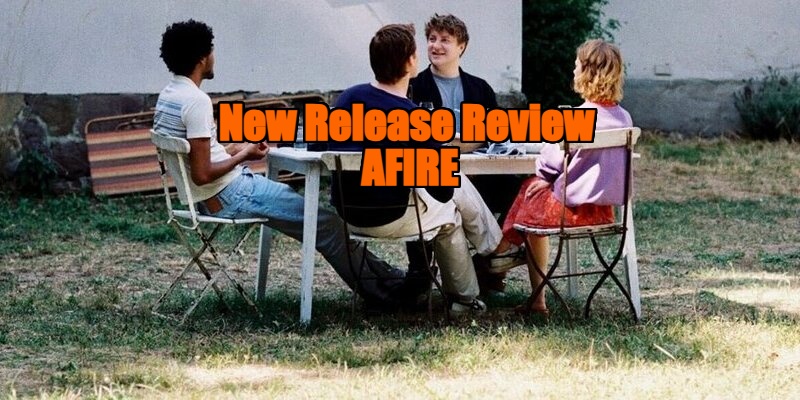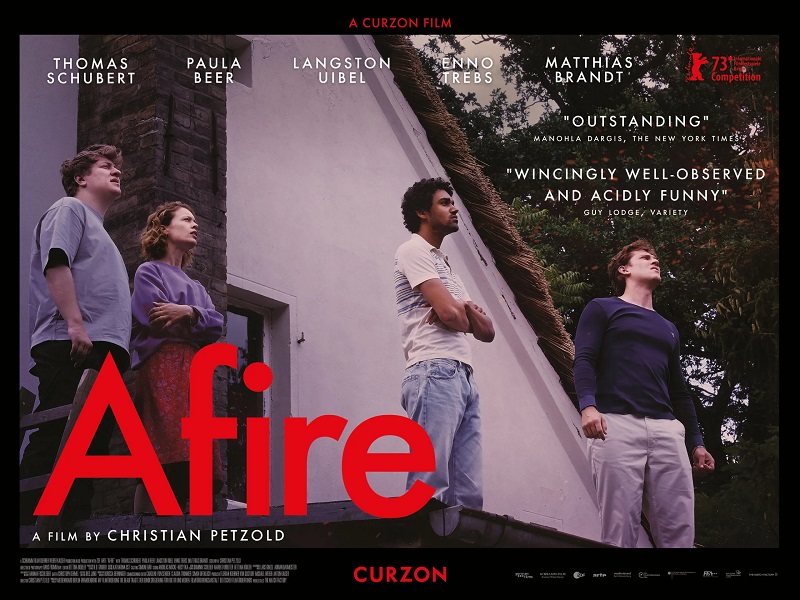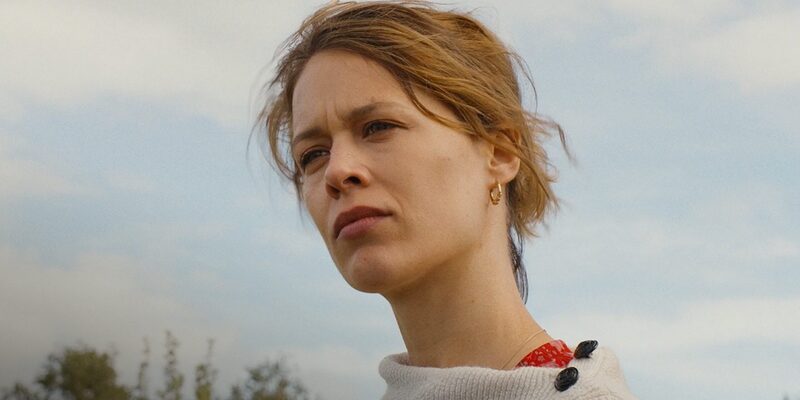
A narcissistic writer's stay at a friend's holiday home leads to
self-doubt amid encroaching forest fires.
Review by
Eric Hillis
Directed by: Christian Petzold
Starring: Thomas Schubert, Paula Beer, Langston Uibel, Enno Trebs, Matthias Brandt

Writers, huh? What a bunch of preening, narcissistic, self-absorbed
plonkers, am I right? At least that's the common stereotype, and to be
fair it's one many writers are happy to embrace. Take Leon, the
loathsome pro/antagonist of writer/director Christian Petzold's
Afire, which following mermaid fantasy
Undine
is the second in a planned quartet of films centred around the four
elements of water, fire, earth and air. Played by
Thomas Schubert, Leon is almost a parodic portrait of the artist
as a surly young man. After seeing mild success with his first novel,
Leon is in the process of finishing its followup. Trouble is, to borrow
Donald Sutherland's self-assessment of his own novel in
Animal House, it's a "piece of shit." And Leon is well aware of this.

In the naïve hope of reworking the novel before a fateful meeting with
his publisher (Lars von Trier lookalike Matthias Brandt), Leon
heads to the shores of Germany's Baltic coast with his friend Felix (Langston Uibel) for a stay at the holiday home of the latter's family. While Felix
bounds enthusiastically in the direction of the beach, Leon insists on
staying put to get some work done, but ends up pottering about and
throwing a tennis ball against the wall.
Leon's inability to focus on his writing is compounded by the arrival
of Nadja (Paula Beer), a young woman staying at the house for the
summer while she mans an ice cream stall at the beach. Because Nadja is
played by Paula Beer, Leon is immediately infatuated, but Nadja is
hooking up with Devid (Enno Trebs), a hunky local
lifeguard.

Leon's insecurities see him lash out at others. He mocks Felix's plan
for a photographic portfolio based on portraits of people staring at the
sea. When Devid proves himself a natural storyteller in his relaying of
a dinner table joke, Leon resorts to classism, mocking his job as a
"rescue swimmer." Felix and Devid brush it off, distracted by their
growing mutual attraction, but Nadja doesn't stand for Leon's bullshit.
Insisting on reading his novel, she dismisses it as "shit." Initially
Leon consoles himself that this is the worthless appraisal of a lowly
ice cream seller, but when Nadja's own literary talents are revealed
it's a dagger in the ego of Leon.
It's not hard to imagine that Petzold has created the character of Leon
as a form of self-assessment, like throwing darts at a dartboard upon
which is pinned his own portrait. Of the many portrayals of the worst
elements of those who choose the vocation of writing, Leon's might be
the most unflattering. Ultimately however, Petzold asks for some
sympathy for his put-upon protagonist, but I'm not sure it's ever
earned, and his semi-redemption relies on a late plot development that
comes off as a little tone deaf. It's also heavily implied that both
Nadja and Felix are attracted to the oblivious Leon, and you'll likely
be baffled as to how anyone would want to spend more than two minutes in
his company.

But with the remove of a screen we happily spend close to two hours in
his company and that of the others in his group. Petzold has crafted a
compelling drama with an unlikeable but fascinating and dare I say it,
relatable central character. As played by the beguiling Beer, one of the
few modern actresses who possesses that classical movie star quality,
Nadja is tossed among this bunch of men like a match in a petrol can,
igniting passions both physical and intellectual. Like Leon, we can't
take our eyes off her. If you've ever had a crush on a teacher who
scolded your work, you'll relate to Leon's hurt at her brutally honest
hands.
While all this human drama is playing out there's the impending
catastrophe of encroaching forest fires. The characters assure
themselves that the fire is distant enough not to affect them, but the
sky in the background slowly turns a deeper shade of red, like the
slowly heating rings of an untended hob. Petzold's timely environmental
commentary echoes Leon's self-consumption. Leon can't see the forest for
the trees until the trees are ablaze.


